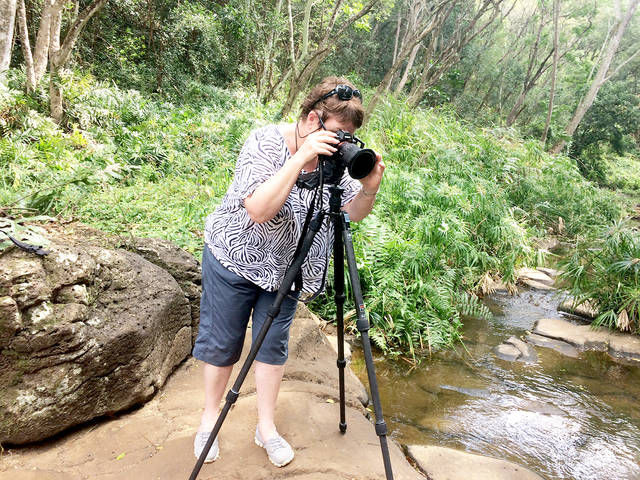Go ahead and stash those rose-colored glasses. It’s goggles of green that’ll make your world shine a little brighter, according to several studies published in recent years. “Nature is really important to our well-being and all these (studies) are evidence
Go ahead and stash those rose-colored glasses. It’s goggles of green that’ll make your world shine a little brighter, according to several studies published in recent years.
“Nature is really important to our well-being and all these (studies) are evidence that it’s good for us in body and mind to be outdoors, and to be able to see nature,” said Janet Berreman, Kauai’s District Health Officer. “There’s research to back that up.”
One study, published in Proceedings of National Academy of Sciences, found time in nature decreases obsessive and negative thoughts; especially for those who walked for 90 minutes in nature.
Another conducted by psychologists Ruth Ann Atchley and David L Strayer found reconnecting with nature increases creative problem solving.
A third study conducted by Frances Kup and Andrea Taylor found that exposing children with ADHD to “green outdoor activities” reduces symptoms.
“There’s a distinction being made between being where there are plants and where there’s manmade structures around you,” Berreman said. “Are you around trees and plants, or surrounded by concrete?”
Out at Ho’opi’i Falls on Monday, Shirley McClintock was soaking in the lush landscape with about six other companions on a photography trip to the island.
“Nature makes me happy,” said McClintock, from Atlanta. “It’s warm and beautiful, makes you feel complete.”
Being in nature is a means of relief from everyday pressures and demands for Karen Filo, who is vacationing on-island with the same photography group.
“You forget your problems when you’re out here and you can just concentrate on the way the water is moving,” she said.
It’s established that physical exercise is good for overall well-being and hiking can burn between 400 and 700 calories per hour.
While that’s great news for everyone, researchers with the University of British Columbia have found that aerobic exercise is especially great for memory loss prevention in women over 70.
That’s because it increases volume in the part of the brain associated with spatial and episodic memory.
Moderate activity within eyesight of plants also increases self-esteem, reduces stress and anxiety, and releases endorphins, researchers have found.
But it’s not necessary to don the special gear and take on the daunting mountain in order to gain the benefits of a little time in nature; a simple walk outside can do the trick.
“I try to get out once a week with my group of friends,” Filo said. “It’s always better to go out in a group, I am more adventurous when I’m with others.”
Outdoor photography sessions, taking a walk through the park, and setting aside some time for a sunset bike ride are all options for scheduling in that daily time with green landscape.
“Those are just as good as hiking,” Berreman said. “Think about physical activity in nature in whatever way is most welcoming and inviting, and then do that.”
Studies find that coupled with spending time in nature, it’s also important to take some time away from technology.
In the study, conducted by Atchley and Strayer, participants went backpacking with zero technology over the course of four days. They were asked to perform feats that required creative thinking and complex problem solving.
Researchers found that performance on these tasks improved by 50 percent for those involved.
“If you’re not on your phone, you’re not texting; then you’re available to appreciate the moment in the present,” Berreman said. “There’s evidence that’s good for our well-being as well.”
Walking to work is one of the ways that Berreman gets her nature in for the morning and she focuses on the yards and trees, animals and people that she passes on her way.
“I’m looking at the trees and the chickens and the dogs that bark, it’s not like being on a hike, but I’m certainly not surrounded by concrete and buildings,” she said. “We’re lucky to live in a place where it’s like that.”
•••
Jessica Else, environmental reporter, can be reached at 245-0452 or jelse@thegardenisland.com.


